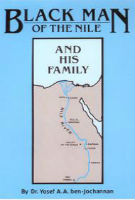 Black Man of the Nile and His Family, first published in 1972, is Dr. Ben’s best known work. It captures much of the substance of his early research on ancient Africa. In a masterful and unique manner, Dr. Ben uses Black Man of the Nile to challenge and expose “Europeanized” African History. He points up the distortion after distortion made in the long record of African contributions to world civilization. Once exposed he attacks these distortions with a vengeance, providing a spellbinding corrective lesson in our story.
Black Man of the Nile and His Family, first published in 1972, is Dr. Ben’s best known work. It captures much of the substance of his early research on ancient Africa. In a masterful and unique manner, Dr. Ben uses Black Man of the Nile to challenge and expose “Europeanized” African History. He points up the distortion after distortion made in the long record of African contributions to world civilization. Once exposed he attacks these distortions with a vengeance, providing a spellbinding corrective lesson in our story.
“In this volume, facts of African History which have been for so long purposefully with-held from the public shall be re-revealed and carefully explained. Africa (Alkebu-lan) will be seen from eyes which are different to the Henry Morton Stanley and David Livingston’s drama; the salvation through Jesus Christ viewpoint; the Tarzan and Jane atmosphere; the “Great White Father” paternalism; and last, but not least, it will include “the lazy Africans who did nothing in Africa before slavery,” and “developed nothing or created nothing historically” propaganda angle of the “Christian missionaries.” These age-old stereotyped racist conceptions about the Africans shall not appear in this book.
The culture of the indigenous peoples of Africa (Alkebu-lan) was copied and adopted extensively by the so-called “Modern” or “Western Man” (Caucasian or white man). Much of “Western Man’s” culture also came from an Africa, which once hold the central focal point of learning of all forms; where man himself has far proven to have originated; at least where the oldest form of man have been unearthed (discovered); also man as he is known today. This Africa, correctly Alkebu-lan, will be reviewed from first-hand information recorded during the periods when the Africans were the teachers of the world and since.
Bearing in mind what has just been stated, a statement of the main purpose for this work is now being entered into, since so many other books on Africa (Alkebu-lan) and her people are being “manufactured” in such abundance these days. Remember, however, that this work cannot cover every minute detail dealing with Africa’s history which each reader believes to be the most important development in Africa. Some of the major and most pivotal occurrences which contributed to the earliest African High-Cultures, from pre-historic time to the final days of the West African Kingdoms and Empires shall be reviewed.” –from, The Preface.
Submit your review | |


